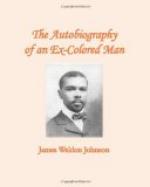All of this was interesting to me; and we drifted along in conversation until my companion struck the subject nearest his heart, the independence of Cuba. He was an exile from the island, and a prominent member of the Jacksonville Junta. Every week sums of money were collected from juntas all over the country. This money went to buy arms and ammunition for the insurgents. As the man sat there nervously smoking his long, “green” cigar, and telling me of the Gomezes, both the white one and the black one, of Maceo and Bandera, he grew positively eloquent. He also showed that he was a man of considerable education and reading. He spoke English excellently, and frequently surprised me by using words one would hardly expect from a foreigner. The first one of this class of words he employed almost shocked me, and I never forgot it; ’twas “ramify.” We sat on the piazza until after ten o’clock. When we arose to go in to bed, it was with the understanding that I should start in the factory on the next day.
I began work the next morning seated at a barrel with another boy, who showed me how to strip the stems from the leaves, to smooth out each half leaf, and to put the “rights” together in one pile, and the “lefts” together in another pile on the edge of the barrel. My fingers, strong and sensitive from their long training, were well adapted to this kind of work, and within two weeks I was accounted the fastest “stripper” in the factory. At first the heavy odor of the tobacco almost sickened me, but when I became accustomed to it, I liked the smell. I was now earning four dollars a week, and was soon able to pick up a couple more by teaching a few scholars at night, whom I had secured through the good offices of the preacher I had met on my first morning in Jacksonville.




